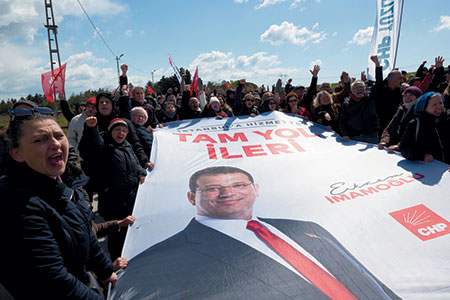
Turkey’s ruling establishment has tried to use the earthquake in the Istanbul area on April 23 against the opposition, which continues to take to the streets in support of Istanbul Mayor Ekrem Imamoglu, who was arrested on March 19. Devlet Bahceli, an ally of President Recep Tayyip Erdogan in the ruling coalition, the leader of the Nationalist Movement Party, said that the main issue on the national agenda should now be the strengthening of the housing stock, not protests.
After the tremors, the epicenter of which was the Marmara Sea, Bahceli complained that Istanbul City Hall had been wasting time in recent years. “Those who neglected their duties of governing the city and became involved in ordinary political polemics deliberately plunged Istanbul into a whirlpool of risk, threats and dangers,” the nationalist leader said. – There is an urgent need to act together to protect and preserve Istanbul. Possible disasters can be overcome through solidarity at the State and national levels and, moreover, by entrusting Istanbul to competent and worthy hands. Earthquakes should now be top of the agenda in Istanbul.”
The statement by Bahceli, who is Erdogan’s partner in the parliamentary coalition, sounded like a rebuke to the Istanbul mayor, who was detained on March 19 on a number of charges. In recent weeks, Imamoglu’s associates in the Republican People’s Party (CHP) have tried to use maximum resources to attract broad segments of the Turkish population to protests and boycotts of those national companies that, according to the CHP, are associated with the ruling elite. Bahceli probably tried to shift public attention from the consequences of the arrest of the mayor, who, according to a significant number of opinion polls, could become Erdogan’s key rival in the presidential elections scheduled for 2028.
The Turkish Minister of Ecology and Urban Development, Murat Kurum, joined the view of the nationalist leader, who in 2024 was Imamoglu’s key rival in the mayoral elections from the presidential party. “Let’s join forces, start a campaign to save Istanbul, to transform it,” Kurum said, addressing the opposition. – The people of Istanbul expect all of us to put politics and political differences aside and focus on this issue… The lives and future of 16 million people are at stake, there is no place for politics and controversy. There is no politics here. In Istanbul, today’s negligence will turn into tomorrow’s disaster. If we are late, our losses will be much greater.”
After the earthquake in the Istanbul area, a statement appeared on Imamoglu’s official account on the social network X, in which the mayor calls the fight against the elements a more serious matter than “winning elections or greed for seats in parliament.” “Therefore, we urgently need unity, cohesion, solidarity and common sense,” he added. However, in a subsequent tweet, Imamoglu noted that the consequences of his arrest had cost the Turkish economy trillions of lira. “With such a large budget, we could renovate about 1 million buildings or build at least the same amount of safe housing,” the mayor said. According to him, the consequences of repression “will eventually penetrate even deeper into the foundation of the economy.”
Now the Turkish opposition is trying to increase pressure on the government. In a conversation with The Financial Times, the chairman of the RNP, Ozgur Ozel, revealed a three-part strategy for the struggle of his associates. The first element is the symbolic collection of signatures in support of Imamoglu and the convening of early general elections. The second is the intensification and regularity of street actions. Finally, the third part is turning the campaign for Imamoglu’s release into a cause that will resonate with a wide range of voters, regardless of their party affiliation. According to one survey conducted in March during the demonstrations in Ankara, almost 94% of the protesters were under the age of 35, with only half of them being supporters of the CHP.
The decisive factor in the situation around the protests will be how ready Erdogan is to use the repressive apparatus. In an analysis for Foreign Policy, Turkish expert Ozgur Ozkan notes that the Turkish leader may overestimate his strength, especially if at some point he decides to send army units to suppress demonstrations. “The military would like to remain neutral, but if they are pushed too hard to comply with the regime’s demands, they may split, and this will lead to destabilizing consequences not only for Turkey, but for the entire region,” the expert notes.
In his opinion, Erdogan’s control over the armed forces is quite fragile. “The officer corps is not isolated from national grievances: military families are subject to the same economic instability – rapidly rising inflation, housing shortages and declining purchasing power,” Ozkan draws attention. “By politicizing the army and diluting the electoral process, Erdogan has sown the seeds of conflict and instability, undermining both the strength of the regime and the prospect of a peaceful transfer of presidential power.”
In the most negative scenario, if the protests increase in scale and Erdogan clings to power at all costs, the expert argues, “Turkey may turn to the path of Syria or Libya.” And this promises her nothing but a protracted internal conflict and chaos, Ozkan concluded.
